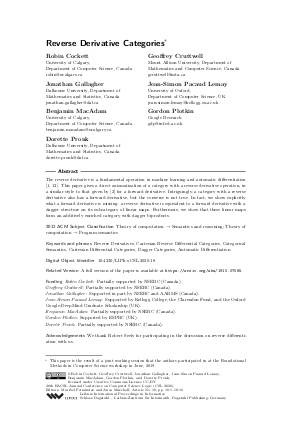Reverse Derivative Categories
Authors Robin Cockett, Geoffrey Cruttwell, Jonathan Gallagher, Jean-Simon Pacaud Lemay, Benjamin MacAdam, Gordon Plotkin, Dorette Pronk
-
Part of:
Volume:
28th EACSL Annual Conference on Computer Science Logic (CSL 2020)
Part of: Series: Leibniz International Proceedings in Informatics (LIPIcs)
Part of: Conference: Computer Science Logic (CSL) - License:
 Creative Commons Attribution 3.0 Unported license
Creative Commons Attribution 3.0 Unported license
- Publication Date: 2020-01-06
File

PDF
LIPIcs.CSL.2020.18.pdf
- Filesize: 0.54 MB
- 16 pages
Document Identifiers
Related Versions
-
A full version of the paper is available at https://arxiv.org/abs/1910.07065.
Subject Classification
ACM Subject Classification
- Theory of computation → Semantics and reasoning
- Theory of computation → Program semantics
Keywords
- Reverse Derivatives
- Cartesian Reverse Differential Categories
- Categorical Semantics
- Cartesian Differential Categories
- Dagger Categories
- Automatic Differentiation
Metrics
- Access Statistics
-
Total Accesses (updated on a weekly basis)
0PDF Downloads0Metadata Views
Abstract
The reverse derivative is a fundamental operation in machine learning and automatic differentiation [Martín Abadi et al., 2015; Griewank, 2012]. This paper gives a direct axiomatization of a category with a reverse derivative operation, in a similar style to that given by [Blute et al., 2009] for a forward derivative. Intriguingly, a category with a reverse derivative also has a forward derivative, but the converse is not true. In fact, we show explicitly what a forward derivative is missing: a reverse derivative is equivalent to a forward derivative with a dagger structure on its subcategory of linear maps. Furthermore, we show that these linear maps form an additively enriched category with dagger biproducts.
Cite As Get BibTex
Robin Cockett, Geoffrey Cruttwell, Jonathan Gallagher, Jean-Simon Pacaud Lemay, Benjamin MacAdam, Gordon Plotkin, and Dorette Pronk. Reverse Derivative Categories. In 28th EACSL Annual Conference on Computer Science Logic (CSL 2020). Leibniz International Proceedings in Informatics (LIPIcs), Volume 152, pp. 18:1-18:16, Schloss Dagstuhl – Leibniz-Zentrum für Informatik (2020)
https://doi.org/10.4230/LIPIcs.CSL.2020.18
BibTex
@InProceedings{cockett_et_al:LIPIcs.CSL.2020.18,
author = {Cockett, Robin and Cruttwell, Geoffrey and Gallagher, Jonathan and Lemay, Jean-Simon Pacaud and MacAdam, Benjamin and Plotkin, Gordon and Pronk, Dorette},
title = {{Reverse Derivative Categories}},
booktitle = {28th EACSL Annual Conference on Computer Science Logic (CSL 2020)},
pages = {18:1--18:16},
series = {Leibniz International Proceedings in Informatics (LIPIcs)},
ISBN = {978-3-95977-132-0},
ISSN = {1868-8969},
year = {2020},
volume = {152},
editor = {Fern\'{a}ndez, Maribel and Muscholl, Anca},
publisher = {Schloss Dagstuhl -- Leibniz-Zentrum f{\"u}r Informatik},
address = {Dagstuhl, Germany},
URL = {https://drops.dagstuhl.de/entities/document/10.4230/LIPIcs.CSL.2020.18},
URN = {urn:nbn:de:0030-drops-116611},
doi = {10.4230/LIPIcs.CSL.2020.18},
annote = {Keywords: Reverse Derivatives, Cartesian Reverse Differential Categories, Categorical Semantics, Cartesian Differential Categories, Dagger Categories, Automatic Differentiation}
}
Author Details
- Mount Allison University, Department of , Mathematics and Computer Science, Canada
Funding
- Cockett, Robin: Partially supported by NSERC (Canada).
- Cruttwell, Geoffrey: Partially supported by NSERC (Canada).
- Gallagher, Jonathan: Supported in part by NSERC and AARMS (Canada).
- Lemay, Jean-Simon Pacaud: Supported by Kellogg College, the Clarendon Fund, and the Oxford Google-DeepMind Graduate Scholarship (UK).
- MacAdam, Benjamin: Partially supported by NSERC (Canada).
- Plotkin, Gordon: Supported by ESPRC (UK).
- Pronk, Dorette: Partially supported by NSERC (Canada).
Acknowledgements
We thank Robert Seely for participating in the discussion on reverse differentiation with us.
References
- Martín Abadi, Ashish Agarwal, Paul Barham, Eugene Brevdo, Zhifeng Chen, Craig Citro, Greg S. Corrado, Andy Davis, Jeffrey Dean, Matthieu Devin, Sanjay Ghemawat, Ian Goodfellow, Andrew Harp, Geoffrey Irving, Michael Isard, Yangqing Jia, Rafal Jozefowicz, Lukasz Kaiser, Manjunath Kudlur, Josh Levenberg, Dandelion Mané, Rajat Monga, Sherry Moore, Derek Murray, Chris Olah, Mike Schuster, Jonathon Shlens, Benoit Steiner, Ilya Sutskever, Kunal Talwar, Paul Tucker, Vincent Vanhoucke, Vijay Vasudevan, Fernanda Viégas, Oriol Vinyals, Pete Warden, Martin Wattenberg, Martin Wicke, Yuan Yu, and Xiaoqiang Zheng. TensorFlow: Large-scale machine learning on heterogeneous systems, 2015. Software available from tensorflow.org. URL: https://www.tensorflow.org/.
-
R. Blute, R. Cockett, and R. Seely. Cartesian Differential Categories. Theory and Applications of Categories, 22:622-672, 2009.

-
R. Blute, R. Cockett, and R. Seely. Cartesian Differential Storage Categories. Theory and Applications of Categories, 30(18):620-686, 2015.

-
R.F. Blute, J.R.B. Cockett, and R.A.G. Seely. Differential categories. Mathematical structures in computer science, 16(6):1049-1083, 2006.

-
F. Borceaux. Handbook of categorical algebra II. Cambridge University Press, 2008.

-
Bruce Christianson. A Leibniz notation for automatic differentiation. In Recent Advances in Algorithmic Differentiation, volume 87 of Lecture Notes in Computational Science and Engineering, pages 1-9. Springer, 2012.

-
J.R.B. Cockett, G.S.H. Cruttwell, and J.D. Gallagher. Differential restriction categories. Theory and applications of categories, 25(21):537-613, 2011.

- J.R.B. Cockett and Stephen Lack. Restriction categories I: categories of partial maps. Theoretical Computer Science, 270(1):223-259, 2002. URL: https://doi.org/10.1016/S0304-3975(00)00382-0.
-
R. Cockett and G. Cruttwell. Differential structure, tangent structure, and SDG. Applied Categorical Structures, 22:331-417, 2014.

-
Robin Cockett, Geoffrey Cruttwell, Jonathan Gallagher, Jean-Simon Lemay, Benjamin MacAdam, Gordon Plotkin, and Dorette Pronk. Reverse derivative categories. Arxiv, 2019.

-
Conal Elliott. The simple essence of automatic differentiation. Proceedings of the ACM on Programming Languages, 2(ICFP):70, 2018.

-
Andreas Griewank. Who invented the reverse mode of differentiation. Documenta Mathematica, Extra Volume ISMP, pages 389-400, 2012.

-
B. Jacobs. Categorical logic and type theory. Number 141 in Studies in logic and the foundations of mathematics. Elsevier, 1999.

- Anders Kock. The dual fibration in elementary terms. arXiv e-prints, page arXiv:1501.01947, January 2015. URL: http://arxiv.org/abs/1501.01947.
-
J-S P. Lemay. A Tangent Category Alternative to the Faa Di Bruno Construction. Theory and Applications of Categories, 33(35):1072-1110, 2018.

-
S. Linnainmaa. Taylor expansion of the accumulated rounding error. BIT Numerical Mathematics, 16:146-160, 1976.

-
G. Plotkin. A Simple Differential Programming Language. MFPS 2018 Keynote Address, June 2018.

- David E Rumelhart, Geoffrey E Hinton, and Ronald J Williams. Learning representations by backpropagating errors. Cognitive modeling, 5:3, 1988. URL: https://www.cs.toronto.edu/hinton/naturebp.pdf.
- Peter Selinger. Dagger Compact Closed Categories and Completely Positive Maps. Electron. Notes Theor. Comput. Sci., 170:139-163, March 2007. URL: https://doi.org/10.1016/j.entcs.2006.12.018.
